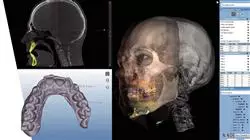University certificate
The world's largest artificial intelligence faculty”
Introduction to the Program
Through this 100% online Master's Degree, you will address the impact of Big Data in Dentistry, examining key concepts and applications”

Bio-inspired Computing is an interdisciplinary field that draws inspiration from nature and biological processes to design algorithms. Its main objective is to address complex problems and find innovative solutions. For example, this tool is useful for solving optimization difficulties in route planning, network design and resource allocation. Likewise, bio-inspired systems are used in anomaly detection by modeling behavior in complex systems (such as computer networks) to identify threats or attacks.
In this context, TECH is developing a university program that will delve into Bio-inspired Computing, taking into account social adaptation algorithms. The syllabus will analyze various space exploration-exploitation strategies for genetic algorithms. In turn, the syllabus will examine evolutionary programming applied to learning problems. The program will also offer students emerging technologies to improve their dental practice, including 3-D printing, robotic systems and teleodontology. This will enable graduates to provide high quality services, while differentiating themselves from the rest.
Moreover, the revolutionary Relearning method is used to ensure gradual learning for students. It is scientifically proven that this teaching model, of which TECH is a pioneer, serves to assimilate knowledge progressively. To this end, it is based on the reiteration of the main concepts so that they remain in the memory without the extra effort involved in memorizing. At the same time, the syllabus is complemented by various audiovisual resources, including explanatory videos, interactive summaries and infographics. All students will need is an electronic device (such as a cell phone, computer or tablet) with Internet access to access the Virtual Campus and expand their knowledge through the most innovative academic content. In addition, the university program includes real case studies in simulated learning environments.
Get a solid foundation in the principles of Artificial Intelligence in Dentistry . Get up to speed with an advanced and adaptable academic program!”
This Master's Degree in Artificial Intelligence in Dentistry contains the most complete and up-to-date program on the market. The most important features include:
- The development of case studies presented by experts in Artificial Intelligence in Dentistry
- The graphic, schematic and eminently practical contents with which it is conceived gather scientific and practical information on those disciplines that are indispensable for professional practice
- Practical exercises where the self-assessment process can be carried out to improve learning
- Its special emphasis on innovative methodologies
- Theoretical lessons, questions to the expert, debate forums on controversial topics, and individual reflection assignments
- Content that is accessible from any fixed or portable device with an Internet connection
You will be able to interpret from dental images through applications of Computational Intelligence, all thanks to the most innovative multimedia resources"
The program’s teaching staff includes professionals from the sector who contribute their work experience to this training program, as well as renowned specialists from leading societies and prestigious universities.
The multimedia content, developed with the latest educational technology, will provide the professional with situated and contextual learning, i.e., a simulated environment that will provide immersive education programmed to learn in real situations.
This program is designed around Problem-Based Learning, whereby the professional must try to solve the different professional practice situations that arise during the academic year For this purpose, the students will be assisted by an innovative interactive video system created by renowned and experienced experts.
The use of Machine Learning in Dentistry will improve the accuracy of your diagnoses and treatments"

Relearning will allow you to learn with less effort and more performance, getting more involved in your professional specialization"
Why study at TECH?
TECH is the world’s largest online university. With an impressive catalog of more than 14,000 university programs available in 11 languages, it is positioned as a leader in employability, with a 99% job placement rate. In addition, it relies on an enormous faculty of more than 6,000 professors of the highest international renown.

Study at the world's largest online university and guarantee your professional success. The future starts at TECH”
The world’s best online university according to FORBES
The prestigious Forbes magazine, specialized in business and finance, has highlighted TECH as “the world's best online university” This is what they have recently stated in an article in their digital edition in which they echo the success story of this institution, “thanks to the academic offer it provides, the selection of its teaching staff, and an innovative learning method aimed at educating the professionals of the future”
A revolutionary study method, a cutting-edge faculty and a practical focus: the key to TECH's success.
The most complete study plans on the university scene
TECH offers the most complete study plans on the university scene, with syllabuses that cover fundamental concepts and, at the same time, the main scientific advances in their specific scientific areas. In addition, these programs are continuously being updated to guarantee students the academic vanguard and the most in-demand professional skills. In this way, the university's qualifications provide its graduates with a significant advantage to propel their careers to success.
TECH offers the most comprehensive and intensive study plans on the current university scene.
A world-class teaching staff
TECH's teaching staff is made up of more than 6,000 professors with the highest international recognition. Professors, researchers and top executives of multinational companies, including Isaiah Covington, performance coach of the Boston Celtics; Magda Romanska, principal investigator at Harvard MetaLAB; Ignacio Wistumba, chairman of the department of translational molecular pathology at MD Anderson Cancer Center; and D.W. Pine, creative director of TIME magazine, among others.
Internationally renowned experts, specialized in different branches of Health, Technology, Communication and Business, form part of the TECH faculty.
A unique learning method
TECH is the first university to use Relearning in all its programs. It is the best online learning methodology, accredited with international teaching quality certifications, provided by prestigious educational agencies. In addition, this disruptive educational model is complemented with the “Case Method”, thereby setting up a unique online teaching strategy. Innovative teaching resources are also implemented, including detailed videos, infographics and interactive summaries.
TECH combines Relearning and the Case Method in all its university programs to guarantee excellent theoretical and practical learning, studying whenever and wherever you want.
The world's largest online university
TECH is the world’s largest online university. We are the largest educational institution, with the best and widest online educational catalog, one hundred percent online and covering the vast majority of areas of knowledge. We offer a large selection of our own degrees and accredited online undergraduate and postgraduate degrees. In total, more than 14,000 university degrees, in eleven different languages, make us the largest educational largest in the world.
TECH has the world's most extensive catalog of academic and official programs, available in more than 11 languages.
Google Premier Partner
The American technology giant has awarded TECH the Google Google Premier Partner badge. This award, which is only available to 3% of the world's companies, highlights the efficient, flexible and tailored experience that this university provides to students. The recognition as a Google Premier Partner not only accredits the maximum rigor, performance and investment in TECH's digital infrastructures, but also places this university as one of the world's leading technology companies.
Google has positioned TECH in the top 3% of the world's most important technology companies by awarding it its Google Premier Partner badge.
The official online university of the NBA
TECH is the official online university of the NBA. Thanks to our agreement with the biggest league in basketball, we offer our students exclusive university programs, as well as a wide variety of educational resources focused on the business of the league and other areas of the sports industry. Each program is made up of a uniquely designed syllabus and features exceptional guest hosts: professionals with a distinguished sports background who will offer their expertise on the most relevant topics.
TECH has been selected by the NBA, the world's top basketball league, as its official online university.
The top-rated university by its students
Students have positioned TECH as the world's top-rated university on the main review websites, with a highest rating of 4.9 out of 5, obtained from more than 1,000 reviews. These results consolidate TECH as the benchmark university institution at an international level, reflecting the excellence and positive impact of its educational model.” reflecting the excellence and positive impact of its educational model.”
TECH is the world’s top-rated university by its students.
Leaders in employability
TECH has managed to become the leading university in employability. 99% of its students obtain jobs in the academic field they have studied, within one year of completing any of the university's programs. A similar number achieve immediate career enhancement. All this thanks to a study methodology that bases its effectiveness on the acquisition of practical skills, which are absolutely necessary for professional development.
99% of TECH graduates find a job within a year of completing their studies.
Master's Degree in Artificial Intelligence in Dentistry
Welcome to TECH Global University's Master's Degree in Artificial Intelligence in Dentistry, a pioneering postgraduate program that combines mastery in oral health with the latest technological innovations. This meticulously designed program is aimed at dental professionals who aspire to excel in the era of digital and intelligent dentistry. In an ever-evolving world, flexibility is key, and our online classes are carefully structured to allow you to advance your career without interruption, from anywhere in the world. As industry leaders, we fully understand the importance of continuing education, and this Master's Degree offers you the opportunity to immerse yourself in the fascinating world of Artificial Intelligence applied to dentistry, without affecting your daily practice. We also use cutting-edge academic methodologies complemented with state-of-the-art multimedia material and the guidance of a teaching staff with remarkable experience in the field. These educational advantages will guarantee you receive an education of the highest quality.
Study an online postgraduate degree and improve your dental practice
The Master's Degree in Artificial Intelligence in Dentistry comprehensively addresses the convergence of technology and dental care, providing you with skills that will put you at the forefront of digital transformation in your practice. From accurate diagnosis to personalized treatment planning, you will learn how to use advanced Artificial Intelligence tools that will significantly improve the efficiency of your clinical management. At TECH, we are proud to offer a postgraduate program that goes beyond the conventional, merging the richness of dental expertise with technological innovation. Throughout the Master's Degree, you will have the unique opportunity to participate in practical projects that will allow you to directly apply your knowledge in simulated clinical environments, preparing you comprehensively for the real challenges of modern dentistry. Qualify to lead the future of dentistry with confidence by graduating from TECH Global University. Join us and discover how the combination of dental excellence and Artificial Intelligence can elevate your practice to new levels of precision, efficiency and personalization in dental care.







